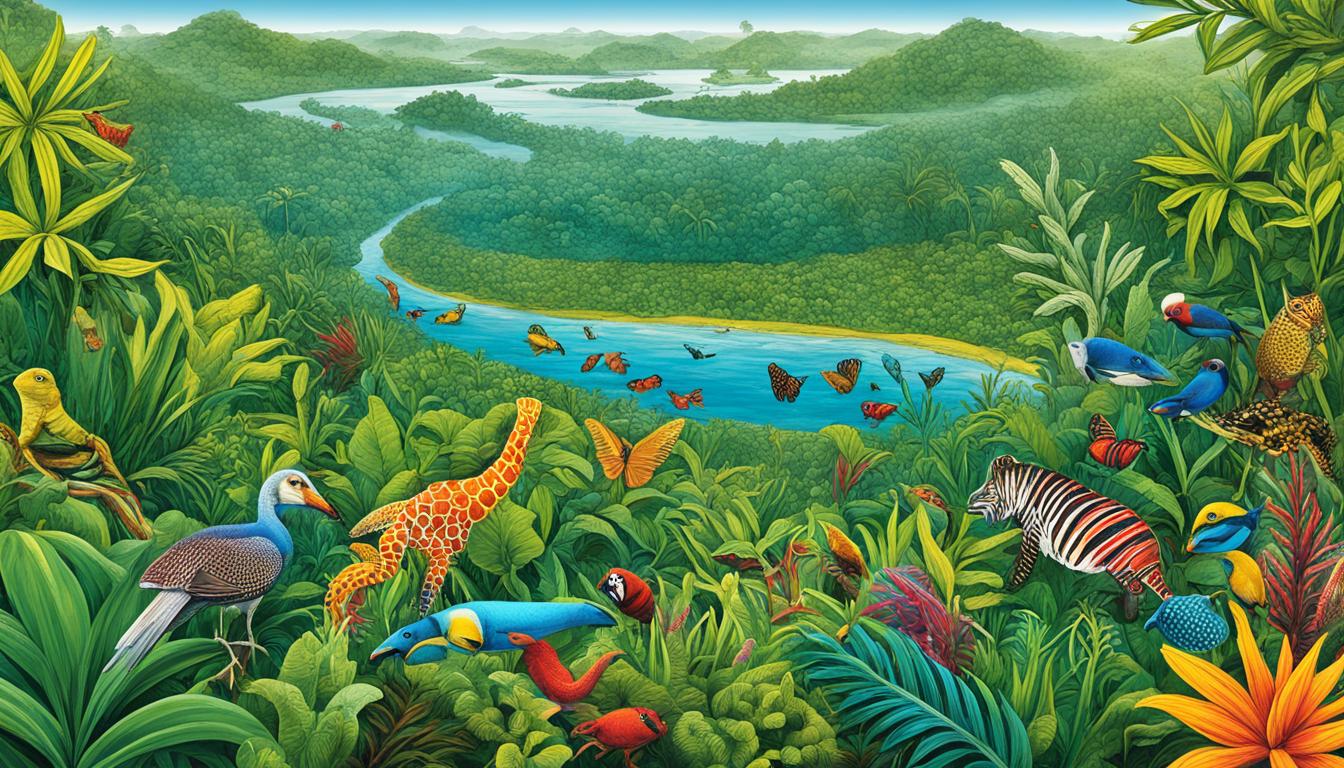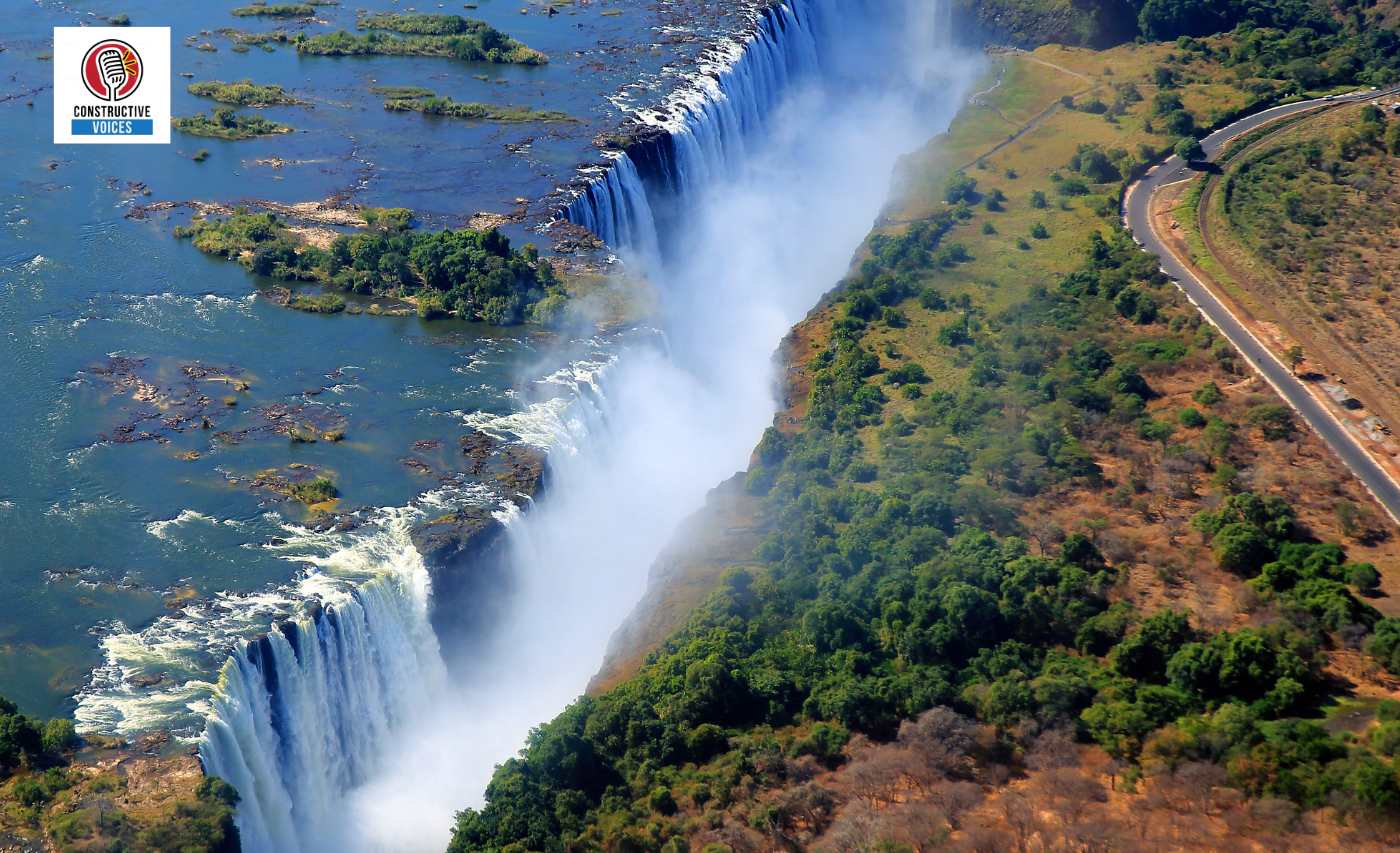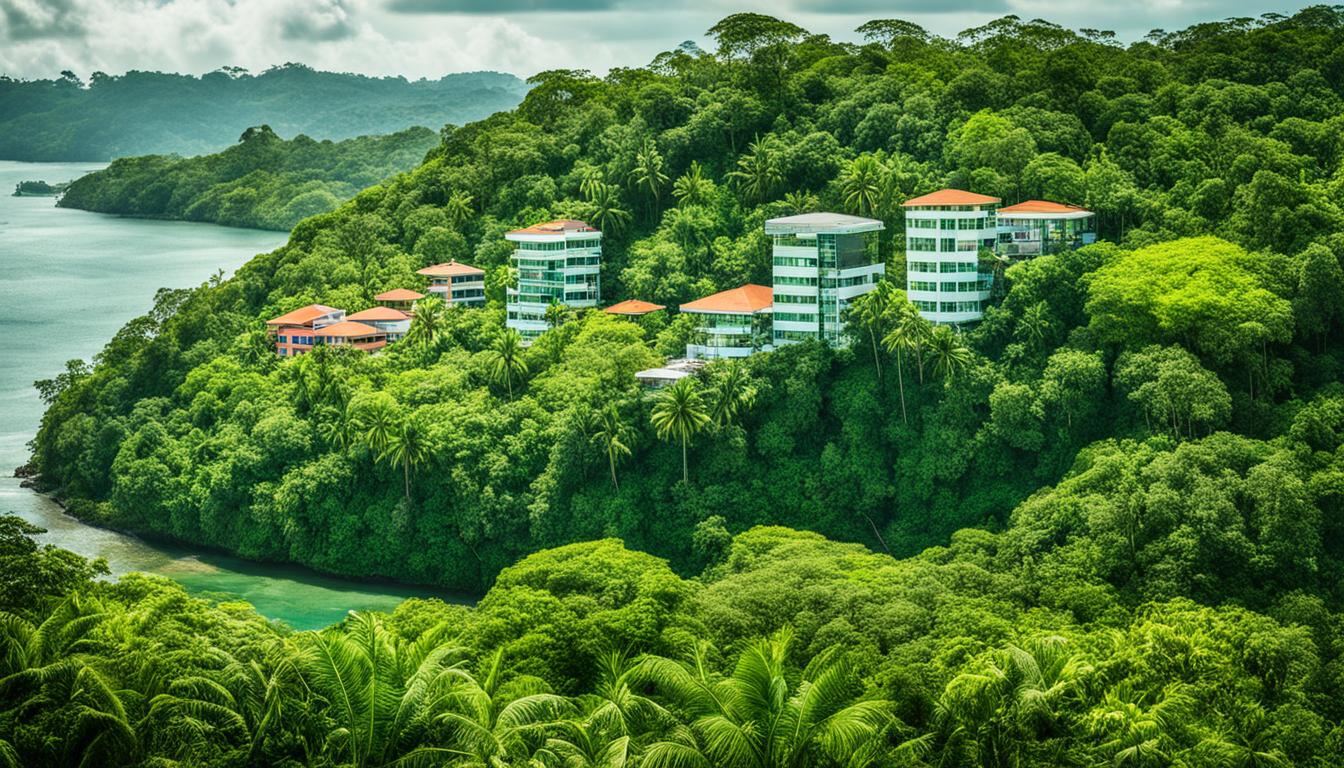France Biodiversity: Animal and Plant Species and What Is Under Threat
Did you know that 25% of animal and plant species in France are under threat of extinction? According to the Intergovernmental Science-Policy Platform on Biodiversity and Ecosystem Services (IPBES), this alarming statistic highlights the urgent need for biodiversity conservation in the country. Biodiversity plays a crucial role in maintaining the delicate balance of ecosystems and providing essential services and resources for human well-being. In this article, we will explore the importance of biodiversity, the unique biodiversity of France, the pressures it faces, and the efforts being made to protect it.
Key Takeaways:
- 25% of animal and plant species in France are under threat of extinction.
- Biodiversity is vital for maintaining ecosystems and providing essential services and resources.
- France is home to diverse flora and fauna, with 5 recognized biodiversity hotspots.
- Habitat destruction, pollution, and climate change are major threats to French biodiversity.
- France has implemented national action plans and strategies to protect its biodiversity.
The Importance of Biodiversity
Biodiversity plays a crucial role in maintaining essential ecosystem services, such as oxygen production, nutrient recycling, and natural disaster regulation. It also directly contributes to human well-being, providing us with food, water, and materials. Unfortunately, human activities have significantly damaged nature, affecting 70% of the land, 40% of the oceans, and 50% of water courses. The degradation of biodiversity is caused by changes in land and water use, resource exploitation, climate change, pollution, and the introduction of invasive species. To ensure sustainable development and address environmental challenges, it is imperative to prioritize the preservation of biodiversity.
“Biodiversity is essential for the maintenance of ecosystem services and the well-being of all species.” – Jane Goodall
The destruction and fragmentation of habitats, overexploitation of resources, and the spread of pollution are direct threats to biodiversity conservation. Preserving biodiversity is vital for the long-term health of our planet and its inhabitants. It plays a significant role in achieving sustainable development goals by supporting ecological balance and mitigating climate change. By protecting and restoring natural habitats, promoting sustainable practices, and preventing invasive species, we can preserve and enhance biodiversity for future generations.
The Benefits of Biodiversity Conservation
Biodiversity conservation is more than just protecting species and ecosystems; it is an investment in our future. Preserving biodiversity provides numerous benefits, including:
- 1. Ecosystem resilience: diverse ecosystems are more resilient to environmental changes and disturbances, ensuring their long-term survival.
- 2. Improved human health: biodiversity provides us with medicinal plants and natural resources that contribute to the development of new treatments and therapies.
- 3. Economic opportunities: ecotourism and sustainable use of natural resources can generate income and employment, benefiting local communities.
- 4. Climate change mitigation: intact forests and oceans act as carbon sinks, absorbing greenhouse gases and helping to regulate global climate patterns.
“The preservation of biodiversity is a vital prerequisite for sustainable development.” – Ban Ki-moon
The Path to Biodiversity Conservation
Preserving biodiversity requires a collective effort from individuals, communities, governments, and organizations. Here are some key steps we can take to safeguard biodiversity:
- 1. Creating protected areas: establishing and effectively managing protected areas to conserve critical habitats and species.
- 2. Implementing sustainable practices: promoting sustainable land and water management, agricultural practices, and fisheries to minimize negative impacts on biodiversity.
- 3. Preventing the introduction of invasive species: implementing strict regulations and monitoring to prevent the introduction and spread of invasive species that can disrupt ecosystems.
- 4. Engaging local communities: involving local communities in conservation efforts, recognizing their traditional knowledge and practices.
“The entire world is dependent upon our taking care of our oceans and protecting the biodiversity that lives there.” – Sylvia Earle
| Threats to Biodiversity | Impact |
|---|---|
| 1. Habitat destruction and fragmentation | Loss of critical habitats, displacement of species, and reduced biodiversity |
| 2. Pollution | Contamination of ecosystems and negative impacts on aquatic and terrestrial species |
| 3. Climate change | Altered habitats, disrupted breeding patterns, and increased species extinction risk |
| 4. Species overexploitation | Decline and extinction of species due to unsustainable hunting, fishing, and harvesting |
| 5. Introduction of invasive species | Disruption of ecosystems, outcompeting native species, and altering natural processes |
Biodiversity conservation is a shared responsibility that requires immediate action to protect our planet’s natural heritage. By adopting sustainable practices, raising awareness, and implementing effective conservation strategies, we can preserve biodiversity in France and ensure a sustainable future for all.
Biodiversity in France
France is a “megadiverse” country, known for its incredible variety of flora and fauna. It is home to an impressive range of ecosystems and landscapes, making it one of the most biodiverse countries in the world. With its picturesque countryside, stunning coastlines, and majestic mountains, France offers a haven for a wide array of plant and animal species.
Within its borders, France encompasses five of the world’s 37 recognized biodiversity hotspots, including its overseas territories. These hotspots are regions of exceptionally high species diversity and endemism, meaning they contain unique species found nowhere else on Earth. They are vital areas for conservation efforts.
In terms of plant life, France boasts an impressive number of species. There are approximately 11,934 plant species recorded in the country, ranging from vibrant wildflowers to towering trees. This diverse flora contributes to the overall richness of France’s ecosystems and provides habitat and sustenance for numerous animal species.
The fauna of France is equally remarkable. The country is home to approximately 43,727 animal species, including mammals, birds, reptiles, amphibians, and a variety of marine life. From the magnificent Alpine ibex in the mountains to the delightful European hedgehog in the forests, France offers a habitat for an astonishing array of creatures.
“France is a treasure trove of biodiversity, with its diverse landscapes and abundant wildlife. Its flora and fauna captivate visitors and scientists alike, showcasing the intricate web of life that exists within its borders.” – Biodiversity researcher
To further highlight the significance of France’s biodiversity, its overseas territories play a crucial role. These territories house an incredible 86% of France’s endemic species, which are species found exclusively in that particular region. The rich biodiversity found in locations such as French Guiana and Reunion Island contributes significantly to the overall ecological value of France.
However, despite France’s natural wealth, its biodiversity faces numerous threats. Pollution, habitat destruction, and climate change pose significant challenges that can disrupt delicate ecosystems and endanger vulnerable species. Conservation efforts are vital to safeguarding France’s flora and fauna for future generations.

France’s commitment to preserving its biodiversity is evident through various protective measures and conservation strategies. By implementing sustainable practices, promoting habitat preservation, and raising awareness about the importance of biodiversity, France strives to mitigate the threats posed to its natural heritage.
By valuing and protecting its flora and fauna, France aims to ensure a harmonious coexistence between humans and nature. Preserving biodiversity not only supports the delicate balance of ecosystems but also enhances the quality of life for all who call France home.
Pressures on Biodiversity in France
Biodiversity in France faces various pressures and drivers of change. Habitat destruction, pollution, invasive species, and climate change are major threats to wildlife and plant species. The impact of these pressures is alarming, with approximately 26% of species in France considered endangered or extinct. Intensive farming practices and land artificialization contribute to habitat fragmentation and destruction, displacing many endangered species in France. Moreover, the use of phytosanitary products in agriculture poses significant risks to biodiversity and environmental protection in France.
The overexploitation of natural resources, especially in marine environments, further exacerbates the threats to biodiversity. Activities such as overfishing, destructive fishing practices, and pollution from shipping and offshore industries harm marine ecosystems, endangering numerous species in France’s coastal waters and marine habitats.
France recognizes the urgency of addressing these issues and is taking proactive steps to mitigate the pressures on biodiversity. The country has established protected areas to conserve important habitats and promote species preservation. Additionally, action plans and strategies are being implemented to combat invasive species, increase awareness about the importance of biodiversity, and actively pursue environmental protection in France.
“Preserving biodiversity is crucial for the long-term sustainability and resilience of ecosystems. It requires concerted efforts to address the complex and interconnected challenges we face today.”
– French Minister of Environment
By adopting sustainable practices, enhancing conservation efforts, and ensuring effective implementation of environmental policies, France is committed to safeguarding its precious biodiversity for future generations.
Pressure Points on Biodiversity in France:
- Habitat destruction
- Pollution
- Invasive species
- Climate change
- Intensive farming practices
- Land artificialization
- Overexploitation of natural resources
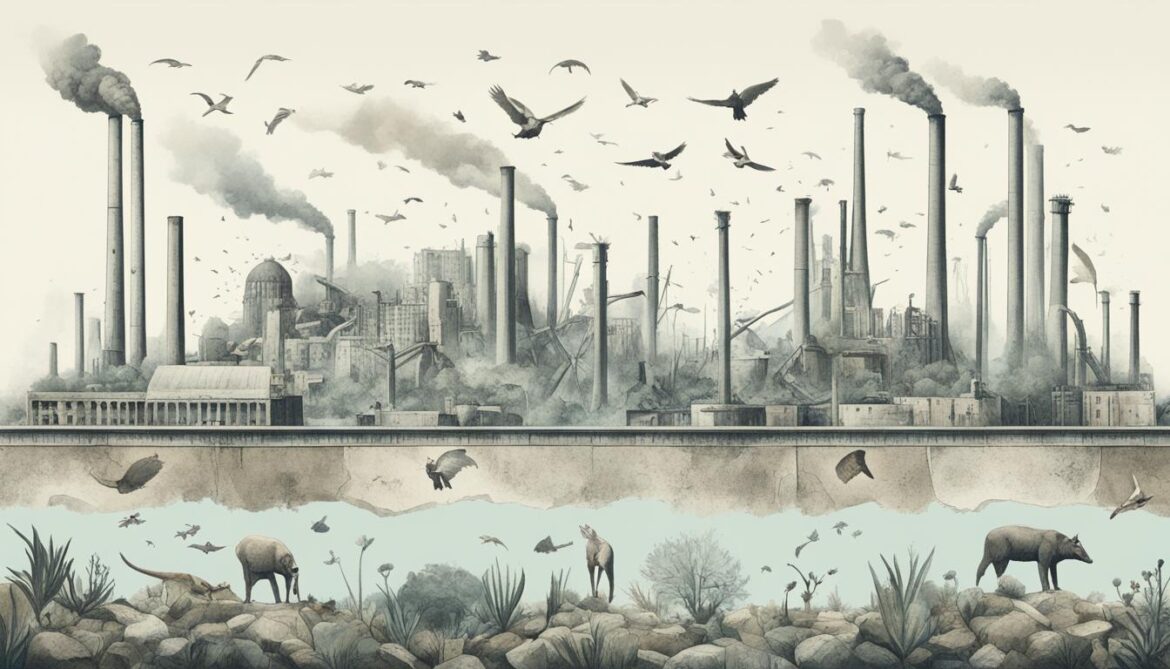
Note: The image portrays the magnificence and vulnerability of endangered species in France.
Protecting Biodiversity in France
France has a long-standing commitment to French wildlife conservation and environmental protection in France. The country has taken significant steps to safeguard its biodiversity, including the establishment of national parks as early as 1960. These protected areas serve as vital habitats for various plant and animal species, contributing to the overall conservation efforts.
To further protect endangered species and natural spaces, France has developed national action plans and legislation. These measures aim to ensure the preservation of biodiversity and prevent the extinction of vulnerable plant and animal species. However, more effective implementation and enforcement of these policies are necessary to effectively combat the ongoing threats to French wildlife.
The French government has set an ambitious goal of increasing the proportion of protected territory to 30% by 2022. This commitment reflects the pressing need to conserve and restore habitats that support diverse ecosystems. By creating protected areas, France aims to provide safe havens for endangered species while promoting sustainable land and resource management practices.
Efforts to protect biodiversity in France go beyond establishing protected areas. The country is actively implementing action plans tailored to specific species to ensure their survival and recovery. These plans involve scientific research, habitat restoration, and captive breeding programs to support population growth. Additionally, raising public awareness about the importance of biodiversity conservation is crucial for fostering a sense of responsibility and encouraging individual actions to protect the environment.
France’s overseas territories, including islands and rich marine environments, play a crucial role in preserving biodiversity. These territories are home to unique and fragile ecosystems that require special attention and comprehensive conservation strategies. By prioritizing the protection of these vulnerable habitats, France demonstrates its commitment to safeguarding biodiversity on a global scale.
Overall, preserving biodiversity is a shared responsibility that requires collaborative efforts from governments, organizations, and individuals. France has made significant progress in wildlife conservation and environmental protection, but continuous dedication and innovative approaches are necessary to address the challenges posed by habitat destruction, pollution, and climate change. By actively protecting biodiversity, France contributes to the global mission of ensuring the sustainability and well-being of our planet’s natural resources.
Challenges and Opportunities for Biodiversity Conservation in France
Conserving biodiversity in France presents both challenges and opportunities. The loss of biodiversity has far-reaching environmental and socio-economic consequences that cannot be ignored. To address this, the French government has set ambitious goals to combat the decline, including reducing pesticide use by 50% by 2025 and increasing the proportion of protected territory. However, implementation and progress need to be accelerated to meet these targets effectively.
France’s unique geographic position and rich biodiversity offer opportunities for leadership in global conservation efforts. Its diverse ecosystems and species provide a platform for research, innovation, and collaborative approaches to address the crisis. By involving stakeholders at all levels, from local communities to international organizations, France can develop comprehensive strategies that prioritize biodiversity conservation.
To highlight the importance of biodiversity, here is a quote from French President Emmanuel Macron:
“We have a moral responsibility to preserve our natural heritage. Biodiversity conservation is not just about protecting ecosystems. It is about ensuring the health and well-being of future generations.”
In order to successfully conserve biodiversity in France, increased research and innovation play a crucial role. By investing in scientific studies and technological advancements, the country can enhance its understanding of key conservation strategies. This knowledge can guide policymakers, environmental organizations, and individuals in making informed decisions to protect and restore habitats.
The Role of French Wildlife Conservation Organizations
French wildlife conservation organizations play a vital role in safeguarding biodiversity. Organizations such as the French Biodiversity Agency (AFB) and the French National Museum of Natural History (MNHN) work tirelessly to monitor species populations, identify threats, and implement conservation measures. Their efforts ensure the long-term survival of endangered species and the preservation of vital ecosystems.
| French Wildlife Conservation Organizations | Focus Areas |
|---|---|
| French Biodiversity Agency (AFB) | Monitoring endangered species, habitat restoration, public awareness |
| French National Museum of Natural History (MNHN) | Scientific research, environmental education, species conservation programs |
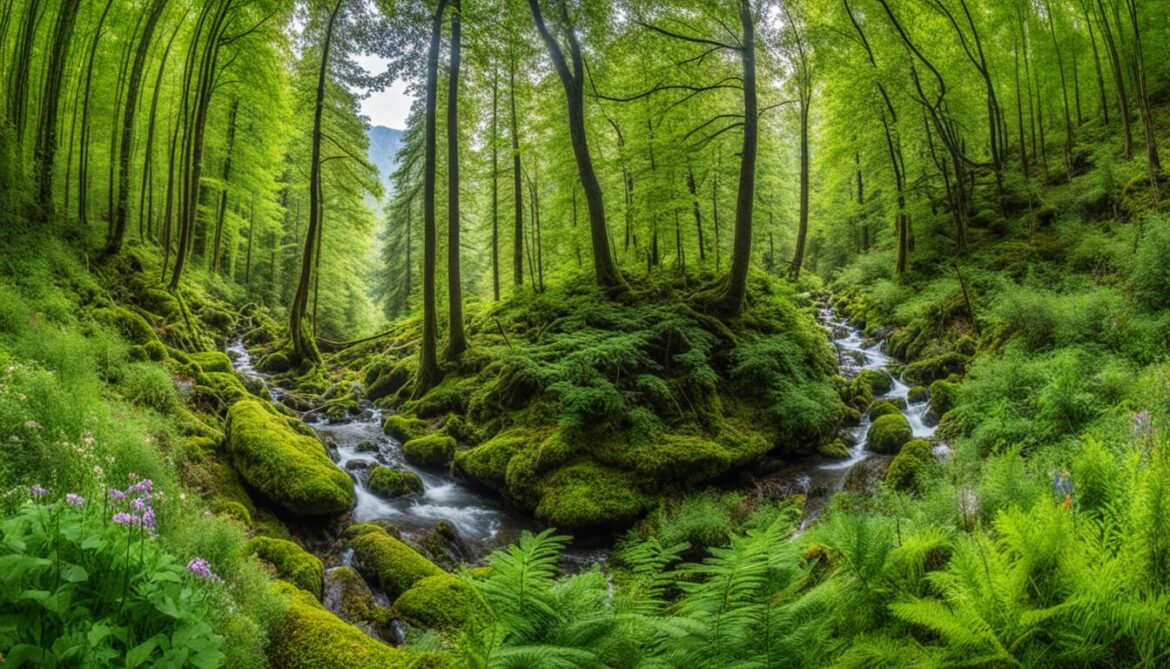
These organizations collaborate with local communities, academic institutions, and international partners to ensure the effective implementation of conservation strategies. Through their collective efforts, they contribute significantly to the preservation of French biodiversity and inspire global conservation initiatives.
The challenges faced by biodiversity conservation in France are complex, but with the right commitment, collaboration, and innovation, opportunities can be seized to protect and restore the country’s natural heritage. By prioritizing biodiversity conservation, France can become a global leader in sustainable environmental practices and inspire positive change worldwide.
France’s Role in Global Biodiversity Conservation
France plays a significant role in global biodiversity conservation due to its diverse ecosystems, overseas territories, and international commitments. The country is committed to making biodiversity a priority on the world’s political agenda and obtaining ambitious outcomes at international conferences and summits.
France actively participates in international negotiations and has developed national strategies aligned with international goals and targets. The hosting of the IUCN World Conservation Congress in 2021 further demonstrates France’s commitment to global biodiversity conservation.
France’s Diverse Ecosystems and Overseas Territories
France is blessed with diverse ecosystems, from the snow-capped Alps to the stunning Mediterranean coast. These ecosystems provide an ideal habitat for a wide range of plant and animal species. Additionally, France’s overseas territories, such as French Guiana and Reunion Island, contribute significantly to its biodiversity richness. These territories are home to many unique and endangered species found nowhere else on Earth.
France’s commitment to biodiversity conservation extends beyond its borders. The country recognizes the importance of protecting not only its own natural heritage but also the global biodiversity upon which the health and well-being of the planet depend.
International Commitments and Collaborations
France actively engages in international commitments and collaborations to address the global biodiversity crisis. The country is a signatory to international agreements such as the Convention on Biological Diversity (CBD) and the Paris Agreement on Climate Change. By aligning its national strategies with these agreements, France aims to ensure the conservation and sustainable use of biodiversity.
Moreover, France’s leadership role in global biodiversity conservation is reinforced by its involvement in organizations and initiatives such as the International Union for Conservation of Nature (IUCN) and the Global Environment Facility (GEF). Through these platforms, France contributes to the development of policies, funding mechanisms, and best practices for biodiversity conservation worldwide.
Conservation Efforts and Success Stories
France has implemented several successful initiatives to protect and restore biodiversity within its borders. The establishment of national parks, nature reserves, and marine protected areas has helped safeguard critical habitats and foster the recovery of threatened species. These protected areas serve as sanctuaries for French wildlife and contribute to the overall conservation of global biodiversity.
One notable success story is the reintroduction of the Bearded Vulture, also known as the Lammergeier, to the French Alps. This iconic bird of prey was once extinct in France but has been successfully reintroduced thanks to conservation efforts and captive breeding programs. This achievement showcases France’s commitment to preserving rare and endangered species.
The IUCN World Conservation Congress 2021
In 2021, France hosted the IUCN World Conservation Congress, the largest global conservation event. The congress brought together government officials, scientists, conservationists, and other stakeholders from around the world to discuss and collaborate on pressing environmental issues, including biodiversity conservation.
The hosting of this significant event further reinforces France’s commitment to playing a leading role in global biodiversity conservation. It provides a platform for sharing knowledge, exchanging best practices, and strengthening international cooperation to address the challenges faced by our planet’s precious biodiversity.
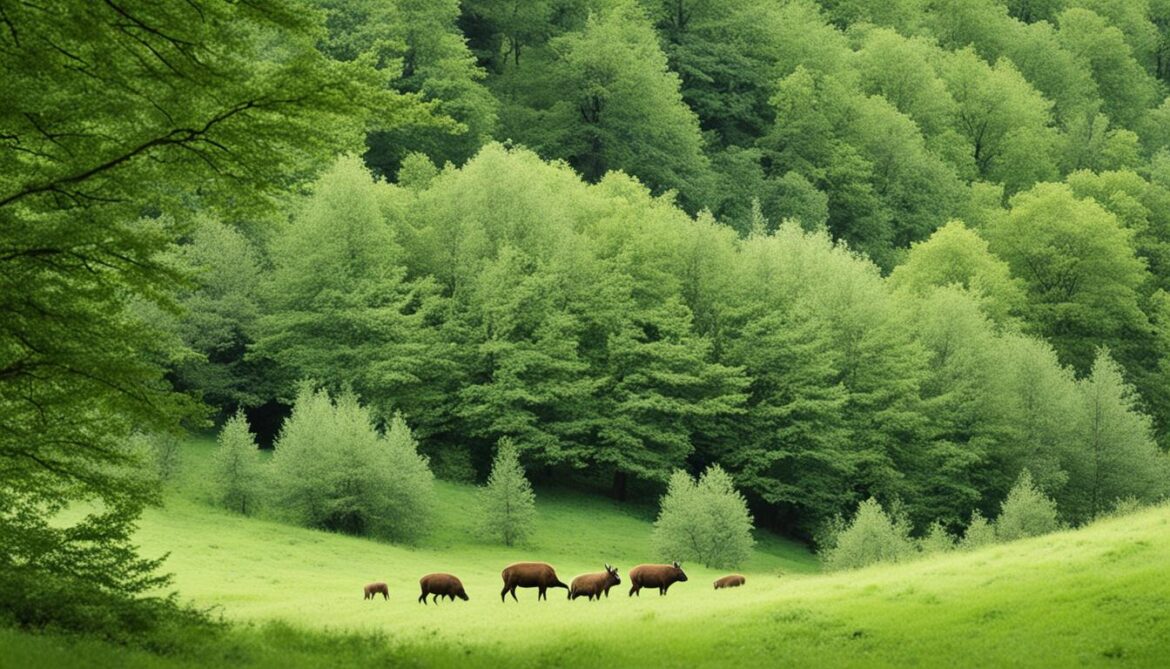
“France’s dedication to protecting biodiversity is not only commendable but also crucial for the shared future of our planet. By actively engaging in global initiatives and implementing effective conservation measures, France inspires and leads the way towards a more sustainable and biodiverse world.”
The Urgent Need to Protect Biodiversity
The alarming rate of species extinction and ecosystem degradation highlights the urgent need to protect biodiversity. France, like many other countries, faces the challenge of balancing economic development with environmental protection. The loss of biodiversity not only impacts ecosystems but also has far-reaching implications for human well-being. To mitigate the threats posed by habitat destruction, pollution, and climate change, France must take immediate action to reduce the use of harmful substances, such as pesticides and herbicides, and promote sustainable practices across various sectors, including agriculture.
Preserving biodiversity is vital for the health and sustainability of ecosystems and the future of our planet. By protecting endangered species in France and preserving biodiversity, we can safeguard the delicate balance of our natural environment and ensure the well-being and survival of both flora and fauna. It is our collective responsibility to take action and implement measures that support the conservation and restoration of biodiversity.
“Biodiversity is the living fabric of our planet, essential for the ecosystems that support life on Earth.”
The preservation of biodiversity requires a multifaceted approach that involves individuals, communities, governments, and organizations. Together, we can contribute to the protection of biodiversity by supporting the establishment and maintenance of protected areas, implementing action plans for endangered species, promoting sustainable practices in various sectors, and raising awareness about the importance of biodiversity conservation.
The Impact of Biodiversity Loss
Loss of biodiversity has profound consequences for ecosystems and the services they provide. It disrupts natural processes such as pollination, nutrient cycling, and water purification, which are essential for the functioning of ecosystems. Additionally, the decline of species diversity can lead to a loss of genetic variation, reducing the resilience and adaptability of populations to environmental changes.
The destruction of habitats and the fragmentation of ecosystems caused by human activities directly contribute to the decline of species and the loss of biodiversity. Moreover, the loss of biodiversity can result in the disruption of ecosystem functions, the spread of invasive species, and the increased vulnerability of ecosystems to climate change.
| Impacts of Biodiversity Loss | Examples |
|---|---|
| Loss of Ecosystem Services | Decline in pollination, reduced water purification, decreased carbon sequestration |
| Disruption of Food Chains | Loss of predators or prey species, imbalance in population sizes, reduced biodiversity of trophic levels |
| Increased Vulnerability to Climate Change | Decreased resilience, reduced ability to withstand and recover from environmental disturbances |
| Spread of Invasive Species | Competition with native species, alteration of natural habitats, disruption of ecological processes |
Protecting biodiversity is crucial for maintaining the ecological balance necessary for the survival and well-being of all species, including humans. It is essential that we recognize the urgent need to take action and implement measures to address the threats facing biodiversity in France and worldwide.
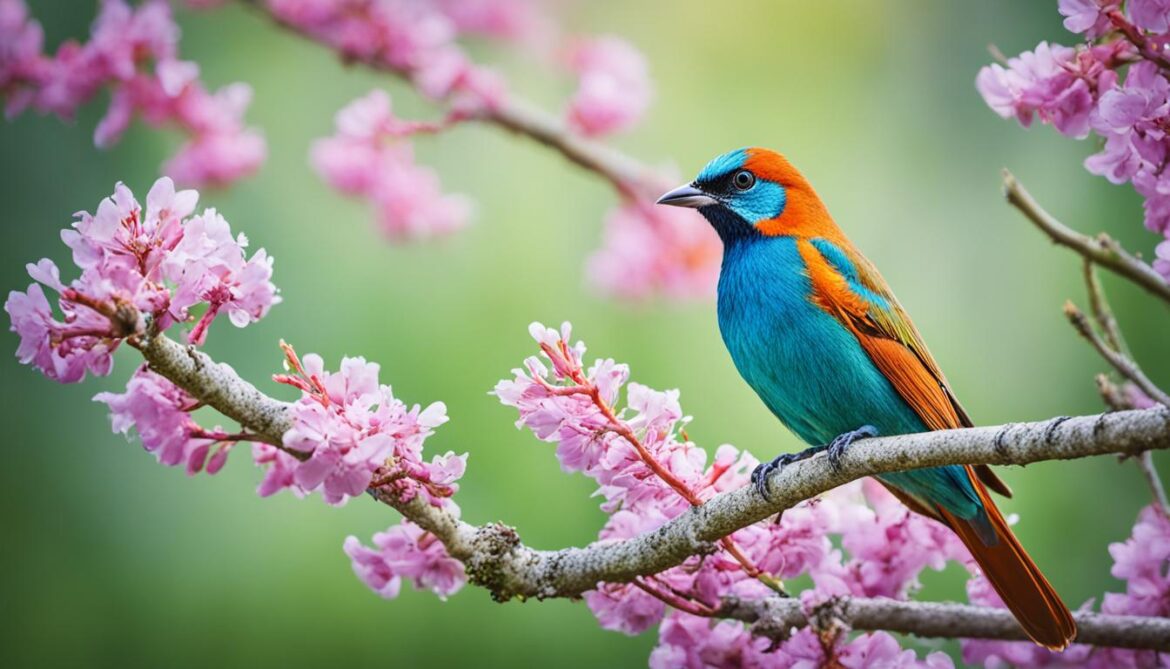
Taking Action to Safeguard Biodiversity
Protecting biodiversity requires collective action and collaboration at all levels. Individuals, communities, governments, and organizations can contribute to safeguarding biodiversity through various initiatives. By supporting protected areas, implementing action plans for endangered species, promoting sustainable practices, and raising awareness about the importance of biodiversity conservation, we can make a significant impact.
In France, efforts to enhance the implementation of the Convention on Biological Diversity are being made through the National Biodiversity Strategy. This strategy focuses on preserving and restoring key habitats, ensuring the sustainable use of natural resources, and promoting knowledge-sharing and research. By investing in increased knowledge, research, and innovation, we can develop effective strategies and solutions for biodiversity conservation in France.
“Conservation is a state of harmony between men and land.” – Aldo Leopold
Collaboration among scientists, policymakers, and local communities is crucial for successful biodiversity conservation. Sharing knowledge, expertise, and best practices can lead to more effective strategies and solutions. In addition, engaging the public through education and awareness-raising campaigns can inspire individuals to make environmentally conscious choices and contribute to the preservation of biodiversity.
France’s National Biodiversity Strategy aims to:
- Promote the restoration and protection of natural habitats
- Sustainably manage forests, wetlands, and marine environments
- Encourage sustainable agriculture and promote biodiversity-friendly practices
- Prevent and control invasive species
- Strengthen research and knowledge-sharing
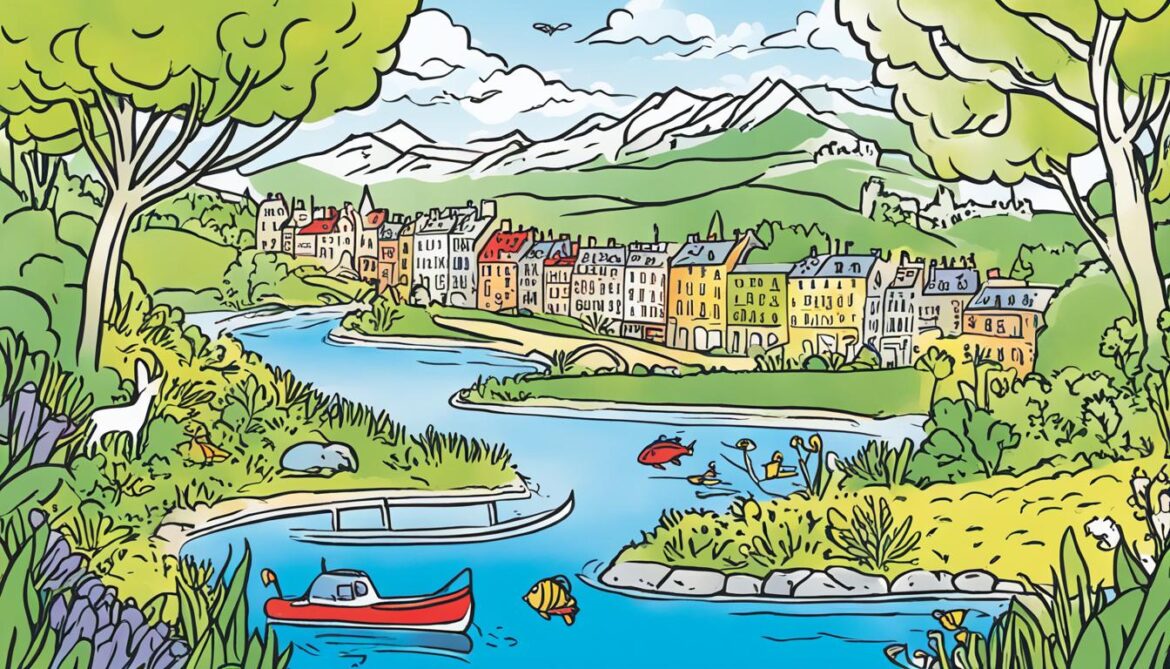
Through these initiatives and the active participation of individuals and communities, we can preserve and enhance biodiversity in France. By protecting the unique flora and fauna that call France home, we safeguard the natural heritage for future generations to enjoy. Together, let’s take action to preserve biodiversity and create a sustainable future for our planet.
Conclusion
The preservation of biodiversity in France is of utmost importance. The country possesses a rich and diverse natural heritage that is under threat from human activities. Protecting biodiversity is crucial for maintaining ecosystem services, ensuring food security, and addressing climate change. France has made commitments to promote biodiversity conservation globally and has taken steps to protect its own biodiversity through national strategies and action plans. However, there is a need for increased implementation and acceleration of measures to address the urgent challenges facing biodiversity. Preserving biodiversity is not only an environmental necessity but also a moral responsibility for the well-being of current and future generations.
FAQ
Why is biodiversity important?
What is the state of biodiversity in France?
What are the main drivers of biodiversity change in France?
What is France doing to protect biodiversity?
What are the challenges and opportunities for biodiversity conservation in France?
What is France’s role in global biodiversity conservation?
Why is it urgent to protect biodiversity?
How can individuals contribute to safeguarding biodiversity?
Source Links
- https://www.cbd.int/countries/profile?country=fr
- https://www.climatescorecard.org/2020/06/one-in-four-species-in-france-is-endangered-despite-biodiversity-protection-efforts/
- https://www.diplomatie.gouv.fr/en/french-foreign-policy/climate-and-environment/the-preservation-of-biodiversity/french-policy-on-biodiversity/




